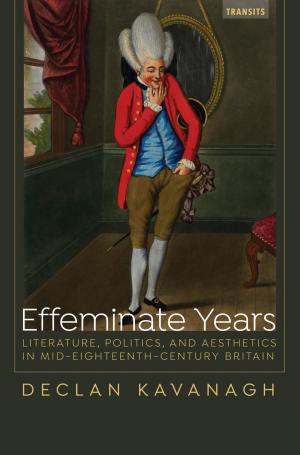Print Technology in Scotland and America, 1740–1800
Fiction & Literature, Literary Theory & Criticism, British, American| Author: | Louis Kirk McAuley | ISBN: | 9781611485448 |
| Publisher: | Bucknell University Press | Publication: | November 7, 2013 |
| Imprint: | Bucknell University Press | Language: | English |
| Author: | Louis Kirk McAuley |
| ISBN: | 9781611485448 |
| Publisher: | Bucknell University Press |
| Publication: | November 7, 2013 |
| Imprint: | Bucknell University Press |
| Language: | English |
In Print Technology in Scotland and America Louis Kirk McAuley investigatesthe mediation of popular-political culturein Scotland and America, from thetransatlantic religious revivals known as theGreat Awakening to the U.S. presidentialelection of 1800. By focusing on Scotlandand America—and, in particular, thetension between unity and fragmentationthat characterizes eighteenth-centuryScottish and American literature andculture—Print Technology aims to increaseour understanding of how tensions withinthese corresponding political and culturalarenas altered the meaning of printas an instrument of empire and nationbuilding. McAuley reveals how seeminglydisparate events, including journalism andliterary forgery, were instrumental andinnovative deployments of print not as a liberation technology (as Habermas’s analysis of print's structural transformation of the public sphere suggests), but as a mediator of political tensions.
In Print Technology in Scotland and America Louis Kirk McAuley investigatesthe mediation of popular-political culturein Scotland and America, from thetransatlantic religious revivals known as theGreat Awakening to the U.S. presidentialelection of 1800. By focusing on Scotlandand America—and, in particular, thetension between unity and fragmentationthat characterizes eighteenth-centuryScottish and American literature andculture—Print Technology aims to increaseour understanding of how tensions withinthese corresponding political and culturalarenas altered the meaning of printas an instrument of empire and nationbuilding. McAuley reveals how seeminglydisparate events, including journalism andliterary forgery, were instrumental andinnovative deployments of print not as a liberation technology (as Habermas’s analysis of print's structural transformation of the public sphere suggests), but as a mediator of political tensions.















